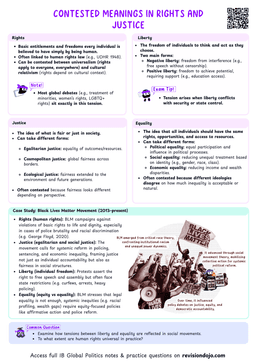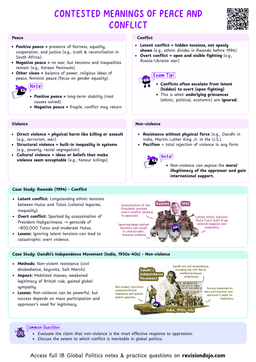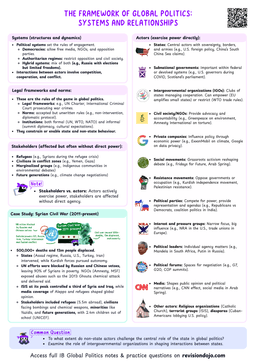Understanding State Legitimacy
State legitimacy
State legitimacy refers to the perceived right of a state to exercise authority and the acceptance of its rule by its population and the international community.
- Internal legitimacy: Derived from domestic factors such as effective governance, rule of law, and public support.
- External legitimacy: Influenced by international recognition, adherence to global norms, and relationships with other states.
- State legitimacy is not static, it evolves based on changing political, economic, and social conditions both domestically and internationally.
Types of External Challenges
- Geopolitical Pressures
- Territorial disputes: Conflicts over borders can undermine a state's sovereignty and legitimacy.
- Example: The Russia-Ukraine conflict, where Russia's annexation of Crimea in 2014 challenged Ukraine's territorial integrity and legitimacy.
- Economic Sanctions and Isolation
- Sanctions: Imposed by other states or international organizations can cripple economies and delegitimize governments.
- Example: Sanctions on Iran have weakened its economy, leading to domestic unrest and questioning of the government's legitimacy.
- Human Rights Violations
- International condemnation: For human rights abuses can erode a state's legitimacy on the global stage.
- Example: Myanmar's military junta faced widespread condemnation and loss of legitimacy after the Rohingya crisis.
- Intervention and Occupation
- Foreign intervention: Military or political intervention can delegitimize a government by portraying it as a puppet of external powers.
- Example: The U.S. invasion of Iraq in 2003 led to questions about the legitimacy of the post-invasion government.
- Global Norms and Institutions
- Failure to comply: With international norms, such as those related to democracy or environmental protection, can undermine legitimacy.
- Example: North Korea's nuclear program has led to its isolation and delegitimization by the international community.
- When analyzing external challenges to state legitimacy, consider both the immediate impacts (e.g., economic hardship from sanctions) and the long-term consequences (e.g., erosion of public trust in government).
Case Studies: External Challenges in Action
1. Venezuela: Economic Sanctions and Political Isolation
- Background
- Venezuela has faced severe economic sanctions from the U.S. and other countries due to its authoritarian governance and human rights abuses.
- Impact on Legitimacy
- Economic collapse: Sanctions have exacerbated the country's economic crisis, leading to widespread poverty and migration.
- International isolation: Many countries recognize opposition leader Juan Guaidó as the legitimate president, undermining Nicolás Maduro's government.
- Venezuela's situation illustrates how external economic pressures can compound internal governance failures, leading to a crisis of legitimacy.
2. Syria: Foreign Intervention and Civil War
- Background
- The Syrian Civil War has seen intervention from multiple foreign powers, including Russia, the U.S., and Iran.
- Impact on Legitimacy
- Fragmented sovereignty: The Assad regime's reliance on foreign military support has raised questions about its independence and legitimacy.
- International condemnation: Widespread human rights abuses have led to Syria's isolation from the global community.
- Syria's conflict highlights how foreign intervention can both bolster and undermine state legitimacy, depending on the perspectives of different actors.
The Role of International Organizations
- United Nations
- The UN plays a crucial role in conferring or withdrawing legitimacy through actions such as recognizing governments or imposing sanctions.
- Example: The UN's refusal to recognize the Taliban as Afghanistan's legitimate government after 2021 reflects international norms and expectations.
- Regional Organizations
- Bodies like the European Union or African Union can influence legitimacy through diplomatic recognition or intervention.
- Example: The African Union's suspension of Sudan following the 2019 military coup signaled a rejection of the junta's legitimacy.
- International organizations often balance respect for state sovereignty with the need to uphold global norms, creating tensions in their responses to legitimacy crises.
Analyzing the Impact of External Challenges
- Short-Term vs. Long-Term Effects
- Short-term: Economic sanctions may weaken a regime's immediate capacity to govern.
- Long-term: Prolonged isolation can lead to systemic instability and loss of public trust.
- Domestic vs. International Perceptions
- Domestic: External challenges may rally nationalist support or fuel dissent, depending on how they are perceived by the population.
- International: A state's reputation and relationships can be permanently damaged by failure to address external criticisms.
- Identify three external challenges to state legitimacy and explain how they interact with internal factors to shape a state's stability.
Theoretical Perspectives
- Realism
- Focuses on the role of power and sovereignty, viewing external challenges as threats to state survival.
- Example: Realists might argue that sanctions weaken a state's ability to defend its interests.
- Liberalism
- Emphasizes the importance of international institutions and norms in shaping legitimacy.
- Example: Liberals might highlight how compliance with human rights norms enhances a state's global standing.
- Constructivism
- Explores how legitimacy is socially constructed through norms, identities, and perceptions.
- Example: Constructivists might analyze how narratives of sovereignty or human rights shape international responses to a crisis.
- How do cultural and historical contexts influence perceptions of state legitimacy?
- Consider how different societies prioritize sovereignty, human rights, or economic stability.
- Balancing Sovereignty and Global Norms
- States must navigate the tension between maintaining sovereignty and adhering to international expectations.
- The Role of Domestic Resilience
- Internal factors, such as strong institutions and public support, can mitigate the impact of external challenges.
- Evolving Nature of Legitimacy
- As global norms and power dynamics shift, states must adapt to new challenges to maintain their legitimacy.
- Reflect on a recent geopolitical crisis.
- How did external challenges impact the legitimacy of the states involved?
- What lessons can be drawn for future conflicts?


